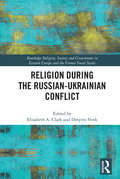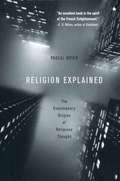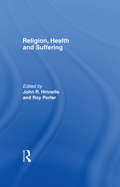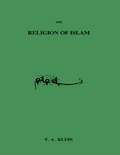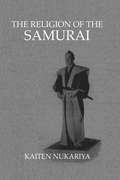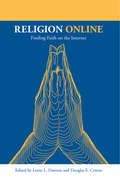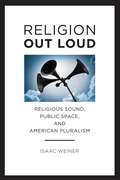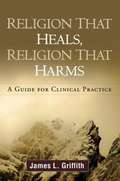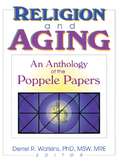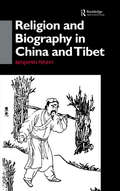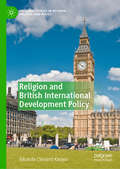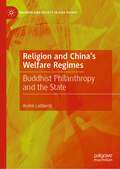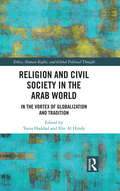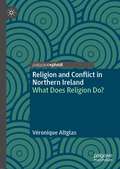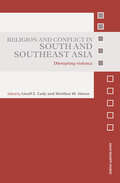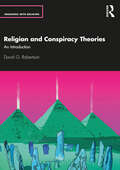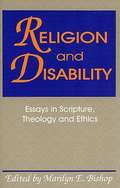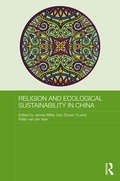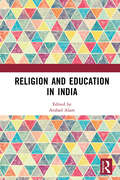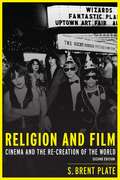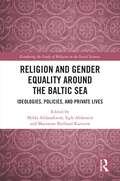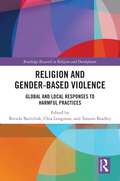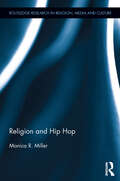- Table View
- List View
Religion During the Russian Ukrainian Conflict (Routledge Religion, Society and Government in Eastern Europe and the Former Soviet States)
by Elizabeth A. Clark; Dmytro VovkThis book investigates how the military conflict between Russia and Ukraine has affected the religious situation in these countries. It considers threats to and violations of religious freedom, including those arising in annexed Crimea and in the eastern part of Ukraine, where fighting between Ukrainian government forces and separatist paramilitary groups backed and controlled by Russia is still going on, as well as in Russia and Ukraine more generally. It also assesses the impact of the conflict on church-state relations and national religion policy in each country and explores the role religion has played in the military conflict and the ideology surrounding it, focusing especially on the role of the Ukrainian and Russian Orthodox churches, as well as on the consequences for inter-church relations and dialogue.
Religion Explained: The Evolutionary Origins of Religious Thought
by Pascal BoyerMany of our questions about religion, says renowned anthropologist Pascal Boyer, are no longer mysteries. We are beginning to know how to answer questions such as "Why do people have religion?" Using findings from anthropology, cognitive science, linguistics, and evolutionary biology, Religion Explained shows how this aspect of human consciousness is increasingly admissible to coherent, naturalistic explanation. This brilliant and controversial book gives readers the first scientific explanation for what religious feeling is really about, what it consists of, and where it comes from.
Religion Health & Suffering
by PorterFirst Published in 1999. Routledge is an imprint of Taylor & Francis, an informa company.
Religion Of Islam
by A F KleinPublished in the year 2004, Religion Of Islam is a valuable contribution to the field of Middle Eastern Studies.
Religion Of The Ancient Celts (Mobi Classics Ser.)
by J. A. MaccullochFirst published in 2005. Routledge is an imprint of Taylor & Francis, an informa company.
Religion Of The Samurai: A Study Of Zen Philosophy And Discipline In China And Japan (Oriental Ser.)
by NukariyaFirst published in 2005. Routledge is an imprint of Taylor & Francis, an informa company.
Religion Online: Finding Faith on the Internet
by Douglas E. Cowan Lorne L. DawsonReligion Online provides an accessible and comprehensive introduction to this burgeoning new religious reality, from cyberpilgrimages to neo-pagan chatroom communities. A substantial introduction by the editors presenting the main themes and issues is followed by sixteen chapters addressing core issues of concern such as youth, religion and the internet, new religious movements and recruitment, propaganda and the countercult, and religious tradition and innovation.
Religion Out Loud: Religious Sound, Public Space, and American Pluralism (North American Religions #14)
by Isaac WeinerFor six months in 2004, controversy raged in Hamtramck, Michigan, as residents debated a proposed amendment that would exempt the adhan, or Islamic call to prayer, from the city’s anti-noise ordinance. The call to prayer functioned as a flashpoint in disputes about the integration of Muslims into this historically Polish-Catholic community. No one openly contested Muslims’ right to worship in their mosques, but many neighbors framed their resistance around what they regarded as the inappropriate public pronouncement of Islamic presence, an announcement that audibly intruded upon their public space.Throughout U.S. history, complaints about religion as noise have proven useful both for restraining religious dissent and for circumscribing religion’s boundaries more generally. At the same time, religious individuals and groups rarely have kept quiet. They have insisted on their right to practice religion out loud, implicitly advancing alternative understandings of religion and its place in the modern world.In Religion Out Loud, Isaac Weiner takes such sonic disputes seriously. Weaving the story of religious “noise” through multiple historical eras and diverse religious communities, he convincingly demonstrates that religious pluralism has never been solely a matter of competing values, truth claims, or moral doctrines, but of different styles of public practice, of fundamentally different ways of using body and space—and that these differences ultimately have expressed very different conceptions of religion itself. Weiner’s innovative work encourages scholars to pay much greater attention to the publicly contested sensory cultures of American religious life.
Religion That Heals, Religion That Harms
by James GriffithFrom James L. Griffith, well known for his work on harnessing the healing potential of religion and spirituality, this book helps clinicians to intervene effectively in situations where religion is causing harm. Vivid examples illustrate how religious beliefs and practices may propel suicide, violence, self-neglect, or undue suffering in the face of medical or emotional challenges. Griffith also unravels the links between psychiatric illness and distorted religious experience. He demonstrates empathic, respectful ways to interview patients who disdain contact with mental health professionals, yet whose religious lives put themselves or others at risk. The book incorporates cutting-edge research on the psychology of religion and social neuroscience.
Religion and Aging: An Anthology of the Poppele Papers
by Derrell R. WatkinsFind solace and wise counsel in these classics of spiritual gerontology!In these days, when so many people live beyond the Biblical threescore and ten, the spiritual questing and questioning of the aged demands a meaningful response from clergy, family members, and nursing home staff. The essays and research studies reprinted in Religion and Aging: An Anthology of the Poppele Papers investigate the role of faith in older people's lives. Many of these classic studies have been updated with new information.These essays were originally published in the Quarterly Papers on Religion and Aging. This renowned journal was issued from 1984 to 1994 by the Poppele Center for Health and Welfare Studies at the Saint Paul School of Theology in Kansas City, Missouri. The issues of spiritual gerontology discussed in that journal are still powerfully relevant today. Because back issues of the journal are not widely available, the cream of its ten-year history is being reissued in permanent form.Religion and Aging offers unfailing wisdom and insight in a broad range of issues, including: training clergy to be more responsive to the needs of older people a historical perspective on the meaning of ”honoring thy father and mother” in first-century Judaism and Christianity the Psalms as a way to help nursing home residents deal with pain, loneliness, anger, and other difficult emotions original research into belief patterns of older Americans ways to give meaning to suffering suggested by the lives and works of Viktor Frankl, Martin Gray, and Rabbi Harold Kushner techniques of communicating with older people Religion and Aging is an invaluable resource to anyone who works with old people, whether in adult day-care programs, nursing homes, hospitals, or other senior citizens’groups. It will help chaplains, pastors, rabbis, and other clergy minister more effectively to the older members of their flock.
Religion and Biography in China and Tibet
by Benjamin PennyThe Chinese and Tibetan traditions value biography as a primary historiographical and literary genre. This volume analyses biographies as texts, taking seriously the literary turn in historical and religious studies and applying some of its insights to an understudied but central corpus of material in Chinese and Tibetan religion.
Religion and British International Development Policy (Palgrave Studies in Religion, Politics, and Policy)
by Aikande Clement KwayuThis book studies the relationship between British government and faith groups in its international development agenda within and beyond the context of Brexit. It includes aspects of International Relations, International Development, and Religion and Politics to trace the relationship between the British government and faith groups, showing that the relationship is enhanced on three conditions: (i) the resurgence of religion in international affairs; (ii) the attitudes of politicians and political parties towards the third sector (i.e. voluntary and private sectors); and (iii) the rising prominence of the international development agenda in British politics. The third condition triggers the need to understand this relationship in the wake of Brexit. Thus, the book aims to analyze to what extent the increasing prominence of an international development agenda in British politics explains the relationship between the government and faith groups, and ultimately whether Brexit has increased the prominence of international development agenda and brought faith groups into closer relations with the government.
Religion and China's Welfare Regimes: Buddhist Philanthropy and the State (Religion and Society in Asia Pacific)
by André LalibertéThis book presents the welfare regime of China as a liminal space where religious and state authorities struggle for legitimacy as new social forces emerge. It offers a unique analysis of relations between religion and state in the People’s Republic of China by presenting how the Chinese Communist Party (CCP) tries to harness Buddhist resources to assist in the delivery of social services and sheds light on the intermingling of Buddhism and the state since 1949. This book will appeal to academics in social sciences and humanities and broader audiences interested in the social role of religions, charity, NGOs, and in social policy implementation. The author explores why the CCP turns to Buddhist followers and their leaders and presents a detailed view of Buddhist philanthropy, contextualized with an historical overview, a regional comparative perspective, and a review of policy debates. This book contributes to our understanding of secularity in a major non-Western society influenced by religions other than Christianity.
Religion and Civil Society in the Arab World: In the Vortex of Globalization and Tradition (Ethics, Human Rights and Global Political Thought)
by Tania Haddad Elie Al HindyThis book examines the links between civil society, religion and politics in the Middle East and North Africa region. The chapters in the volume explore the role of religion in shaping and changing the public sphere in regions that are developing and/or in conflict. They also discuss how these relations are reflected on civil society organizations and the role they are expected to play in transitional periods. This volume: investigates the conceptual dilemmas regarding what is ‘civil society’ in the Arab world today examines the dynamic roles of civil society organizations and religion in the Middle East and North Africa explores the future of the Arab civil society post-‘Arab Spring’ events, and how the latter continues to reshape the demand for democracy in the region. A comprehensive study of how the Arab civil society has come into being and its changing roles, this eclectic work will be of interest to scholars and researchers of politics, especially political Islam, international relations, Middle East Studies, African Studies, sociology and social anthropology.
Religion and Conflict in Northern Ireland: What Does Religion Do?
by Véronique AltglasNorthern Ireland presents a fundamental challenge for the sociology of religion – how do religious beliefs, attitudes and identities relate to practices, violence and conflict? In other words, what does religion do?These interrogations are at the core of this book. It is the first critical and comprehensive review of the ways in which the social sciences have interpreted religion’s significance in Northern Ireland. In particular, it examines the shortcomings of existing interpretations and, in turn, suggests alternative lines of thinking for more robust and compelling analyses of the role(s) religion might play in Northern Irish culture and politics.Through, and beyond, the case of Northern Ireland, the second objective of this book is to outline a critical agenda for the social study of religion, which has theoretical and methodological underpinnings. Finally, this work engages with epistemological issues which never have been addressed as such in the Northern Irish context: how do conflict settings affect the research undertaken on religion, when religion is an object of political and violent contentions? By analysing the scope for objective and critical thinking in such research context, this critical essay intends to contribute to a sociology of the sociology of religion.
Religion and Conflict in South and Southeast Asia: Disrupting Violence (Asian Security Studies)
by Linell E. Cady Sheldon W. SimonA major new contribution to comparative and multidisciplinary scholarship on the alignment of religion and violence in the contemporary world, with a special focus on South and Southeast Asia. Religion and Conflict in South and Southeast Asia shows how this region is the site of recent and emerging democracies, a high degree of religious pluralism, the largest Muslim populations in the world, and several well-organized terrorist groups, making understanding of the dynamics of religious conflict and violence particularly urgent. By bringing scholars from religious studies, political science, sociology, anthropology and international relations into conversation with each other, this volume brings much needed attention to the role of religion in fostering violence in the region and addresses strategies for its containment or resolution. The dearth of other literature on the intersection of religion, politics and violence in contemporary South and Southeast Asia makes the timing of this book particularly relevant. This book will of great interest to advanced undergraduate and postgraduate students of Asian politics, security studies and conflict studies.
Religion and Conspiracy Theories: An Introduction (Engaging with Religion)
by David G. RobertsonReligion and Conspiracy Theories: An Introduction is the first accessible volume to systematically examine the relationship between religion and conspiracy theories in the contemporary world in critical and historical perspective.It lays out the historical development of these important categories, considers different theoretical approaches and looks at case studies of conspiracy theories in religion, about religion and as religion. It maintains a critical perspective throughout on the relationship between truth and power, and in the process provides a fresh perspective on belief and worldviews in our modern world.Designed for use in the classroom, the book features helpful diagrams and resources for teachers. It is an essential read for all students of religion and conspiracy theories, as well as scholars of politics, religious studies, sociology, anthropology and cultural studies.
Religion and Disability: Perspectives in Scripture, Theology, and Ethics
by Marilyn E. BishopA collection of essays on disability and religion.
Religion and Ecological Sustainability in China (Routledge Contemporary China Series)
by James Miller Peter van der Veer Dan Smyer YuThis book sheds light on the social imagination of nature and environment in contemporary China. It demonstrates how the urgent debate on how to create an ecologically sustainable future for the world’s most populous country is shaped by its complex engagement with religious traditions, competing visions of modernity and globalization, and by engagement with minority nationalities who live in areas of outstanding natural beauty on China’s physical and social margins. The book develops a comprehensive understanding of contemporary China that goes beyond the tradition/ modernity dichotomy, and illuminates the diversity of narratives and worldviews that inform contemporary Chinese understandings of and engagements with nature and environment.
Religion and Education in India
by Arshad AlamThis book studies the relationship between religion and education in the Indian context. It analyses the creative interface between religion and education as empirical categories and overlapping modes of pedagogical transmission. The volume investigates the ways in which religious identities are shaped through education both at home and at school. It brings together academics and researchers working in different faith traditions like Islam, Hinduism, and Sikhism to understand the significance of transmitting religious education and the need to pay closer attention to sites through which religious instruction is being disseminated. Topical and lucid, this book will be an important reading for scholars and researchers of sociology, religious studies, secularism, sociology of education, political sociology, South Asia studies, and education in general.
Religion and Film: Cinema and the Re-creation of the World (Critical Concepts In Media And Cultural Studies)
by S. Brent PlateReligion and cinema share a capacity for world making, ritualizing, mythologizing, and creating sacred time and space. Through cinematography, mise-en-scène, editing, and other production activities, film takes the world “out there” and refashions it. Religion achieves similar ends by setting apart particular objects and periods of time, telling stories, and gathering people together for communal actions and concentrated focus. The result of both cinema and religious practice is a re-created world: a world of fantasy, a world of ideology, a world we long to live in, or a world we wish to avoid at all costs.Religion and Film introduces readers to both religious studies and film studies by focusing on the formal similarities between cinema and religious practices and on the ways they each re-create the world. Explorations of film show how the cinematic experience relies on similar aesthetic devices on which religious rituals have long relied: sight, sound, the taste of food, the body, and communal experience. Meanwhile, a deeper understanding of the aesthetic nature of religious rituals can alter our understanding of film production. Utilizing terminology and theoretical insights from the study of religion as well as the study of film, Religion and Film shows that by paying attention to the ways films are constructed, we can shed new light on the ways religious myths and rituals are constructed and vice versa.This thoroughly revised and expanded new edition is designed to appeal to the needs of courses in religion as well as film departments. In addition to two new chapters, this edition has been restructured into three distinct sections that offer students and instructors theories and methods for thinking about cinema in ways that more fully connect film studies with religious studies.
Religion and Gender Equality around the Baltic Sea: Ideologies, Policies, and Private Lives (Gendering the Study of Religion in the Social Sciences)
by Marianne Bjelland Kartzow Milda Ališauskienė Eglė AleknaitėThis volume aims to rethink the intersections of gender and religion, as well as the secular and religious, in implementing and challenging gender equality at individual, institutional, and societal levels in the regions around the Baltic Sea. Acknowledging the diversity of societies and the significance of socio-historical contexts, the empirical data discussed in this book draw attention to the under-researched region of post-socialist Baltic states. The analyses presented in the chapters are based on fieldwork carried out in Lithuania, Latvia, Estonia, and Norway. This volume includes sociological, anthropological, historical, political science, and theological perspectives and covers five broad research areas: a shifting concept of gender equality and its developments in Baltic and Nordic countries; a diversity of developments within religious groups related to issues of gender equality and the negotiation of competing gender ideologies; inter-religious developments and gender equality; the role of religions in the construction of public discourse on gender equality; and religious socialization, focusing on the promotion of religious gender models through socialization and public education.
Religion and Gender-Based Violence: Global and Local Responses to Harmful Practices (Routledge Research in Religion and Development)
by Tamsin Bradley Chia Longman Brenda BartelinkThis book takes religion as an entry point for a deeper exploration into why practices of gender-based violence continue and what possible actions might help to contribute to their eradication. International donors are committed to reducing and ending gender-related harm, particularly violence against women, but clear answers as to why harmful practices persist are often slow to emerge. Theological research struggles to find strong links, yet religion is often referred to by local people as the reason for practices such as female cutting, male circumcision, early and forced marriage, nutritional taboos and birth practices, mandatory (un)veiling, harmful spiritual practices, polygamy, gender unequal marital and inheritance rights and so-called honour crimes. This book presents empirical cases of religious, non-religious and secular actors, including local and international governmental and non-governmental agencies in the fields of development, health and equality policies. Tracing their different understandings of how religion is entangled with gender-based violence both contextually as well as historically, the book sheds light on helpful and unhelpful as well as erroneous and harmful understandings of such practices in local and global perspectives. Centralising the perspectives of women themselves, this book will be an important read for development practitioners and policy makers, as well as for researchers across religious studies, gender studies, and global development.
Religion and Hip Hop: Mapping The New Terrain (Routledge Research in Religion, Media and Culture #3)
by Monica R. MillerReligion and Hip Hop brings together the category of religion, Hip Hop cultural modalities and the demographic of youth. Bringing postmodern theory and critical approaches in the study of religion to bear on Hip Hop cultural practices, this book examines how scholars in religious and theological studies have deployed and approached religion when analyzing Hip Hop data. Using existing empirical studies on youth and religion to the cultural criticism of the Humanities, Religion and Hip Hop argues that common among existing scholarship is a thin interrogation of the category of religion. As such, Miller calls for a redescription of religion in popular cultural analysis - a challenge she further explores and advances through various materialist engagements. Going beyond the traditional and more common approach of analyzing rap lyrics, from film, dance, to virtual reality, Religion and Hip Hop takes a fresh approach to exploring the paranoid posture of the religious in popular cultural forms, by going beyond what "is" religious about Hip Hop culture. Rather, Miller explores what rhetorical uses of religion in Hip Hop culture accomplish for various and often competing social and cultural interests.
Religion and Inequality in America
by Lisa A. Keister Darren E. SherkatDespite the growing quantity and quality of research connecting religion to inequality, no single volume to date brings together key figures to discuss various components of this process. This volume aims to fill this gap with contributions from top scholars in the fields of religion and sociology. The essays in this volume provide important new details about how and why religion and inequality are related by focusing on new indicators of inequality and well-being, combining and studying mediating factors in new and informative ways, focusing on critical and often understudied groups, and exploring the changing relationship between religion and inequality over time.
